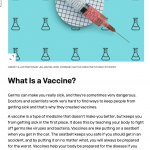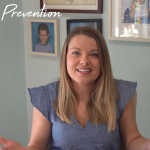You got this. You do you. Happy Mother’s Day to all!
Being a mom isn’t easy, especially during this pandemic, where not only are we homeschooling, but many of us are trying to work, as well. Full-time kids can drive you crazy. But I think that’s normal, and okay to feel that way. My daughter says I often look stressed. (I’m sure I do because I […]
Roald Dahl’s Letter to all Parents Skipping MMR for Their Child
Charlie and the Chocolate Factory, Matilda, BFG, James and the Giant Peach…shall I go on? Some of the greatest books, many turned movies, were written by author Roald Dahl. What you may not know is that behind all of this great writing, Dahl was suffering through the loss of his eldest daughter, Olivia, to measles. […]
I mustache you a question
Stevie mustache you a question. Can you put yourself in the shoes of a parent with an immunocompromised child? (That’s a child with a fragile immune system.) This may be a child with an extreme autoimmune disease, cancer, an infant, an HIV-infected child, or so many other diseases I don’t have time to list. If […]





